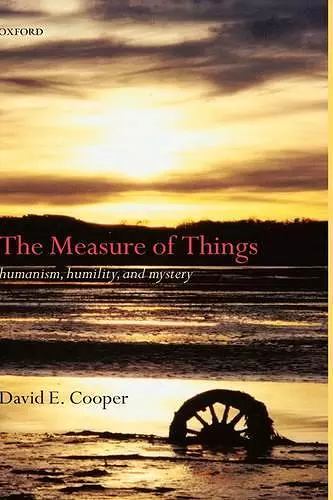The Measure of Things
Humanism, Humility, and Mystery
Format:Hardback
Publisher:Oxford University Press
Published:24th Oct '02
Currently unavailable, and unfortunately no date known when it will be back
This hardback is available in another edition too:
- Paperback£41.99(9780199235988)

Philosophers, both western and eastern, have long been divided between 'humanists', for whom 'man is the measure of things', and their opponents, who claim that there is a way, in principle knowable and describable, that the world anyway is, independent of human perspectives and interests. The early chapters of The Measure of Things chart the development of humanism from medieval times, through the Renaissance, Enlightenment and Romantic periods, to its most sophisticated, twentieth-century form, 'existential humanism'. Cooper does not identify this final position with that of any particular philosopher, though it is closely related to those of Heidegger, Merleau-Ponty and the later Wittgenstein. Among the earlier figures discussed are William of Ockham, Kant, Herder, Nietzsche and William James. Having rejected attempts by contemporary advocates of modest or non-metaphysical realism to dissolve the opposition between humanism and its 'absolutist' rival, Cooper moves on to an adjudication of that rivality. Prompted by the pervasive rhetoric of hubris that the rivals direct against one another, he argues, in an original manner, that the rival positions are indeed guilty of lack of humility. Absolutists - whether defenders of 'The Given' or scientific realists - exaggerate our capacity to ascend out of our 'engaged' perspectives to an objective account of the world. Humanists, conversely, exaggerate our capacity to live without a sense of our subjection to a measure independent of our own perspectives. The only escape, Cooper maintains, from the impasse reached when humanism and absolutism are both rejected, lies in a doctrine of mystery. There is a reality independent of 'the human contribution', but it is necessarily ineffable. Drawing in a novel way upon the Buddhist conception of 'emptiness' and Heidegger's later writings, the final chapters defend the notion of mystery, distinguish the doctrine advanced from that of transcendental idealism, and propose that it is only through appreciation of mystery that measure and warrant may be provided for our beliefs and conduct.
...rich, subtle and hugely ambitious book...Grand scheme, rich in detail, by turns meditative and aggressively analytic, unhurried yet purposive, it is, in short, a book of the highest insight about metaphysics and the meaning of life...prospective readers should notunderestimate the task of reading this book. It is a rich diet and a demanding read that will require close and repeated attention. It brings proportionate rewards. * Ian Ground Philosophy *
Among Cooper's many virtues is a generous - in attitude and quantity - use of continental and eastern philosophy, still unusual and refreshing in a book by a philosopher from the Anglo-American tradition. * Times Higher Education Supplement *
... remarkable ... an unusual and courageous book. Most striking, perhaps, is the originality and ambition of its overall conception, persuasively linking up a range of important questions not standardly seen as germane to each other ... The overall position presented in this book is skilfully woven from these different strands of inquiry and the sheer range of philosophical learning exhibited in the course of it is genuinely impressive. In his generous, searching, and imaginative interpretations and reconstructions of a wide array of heterogeneous but, he argues, often converging sources, Cooper succeeds in presenting and exemplifying an attractive and humane vision of things. It is not the least of the significant merits of his book that it reminds us in the process that the quality of a philosophy lies as much in the questions it has the courage to ask as in the answers it ventures. * Peter Poellner, Mind *
David Cooper has written an extraordinarily rich, deep, thought-provoking book. It is remarkable for its range and its erudition. Cooper engages freely with both eastern and western traditions, with both "continental" and "analytic" traditions, and with both past and contemporary traditions. . . . I think this is a superb book. It amply rewards close and repeated study. * A. W. Moore, Philosophy and Phenomenological Research *
ISBN: 9780198238270
Dimensions: 242mm x 163mm x 26mm
Weight: 694g
384 pages